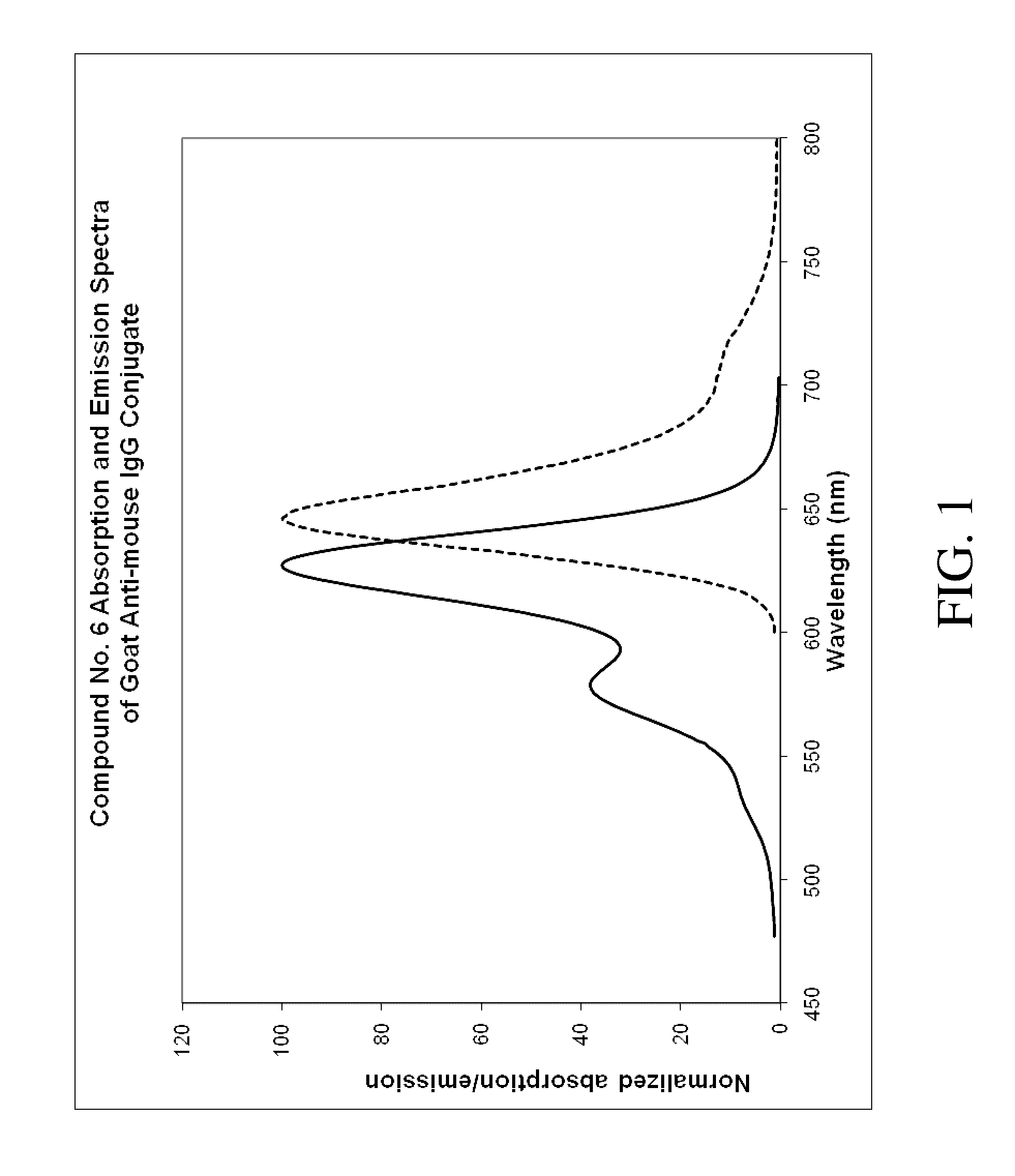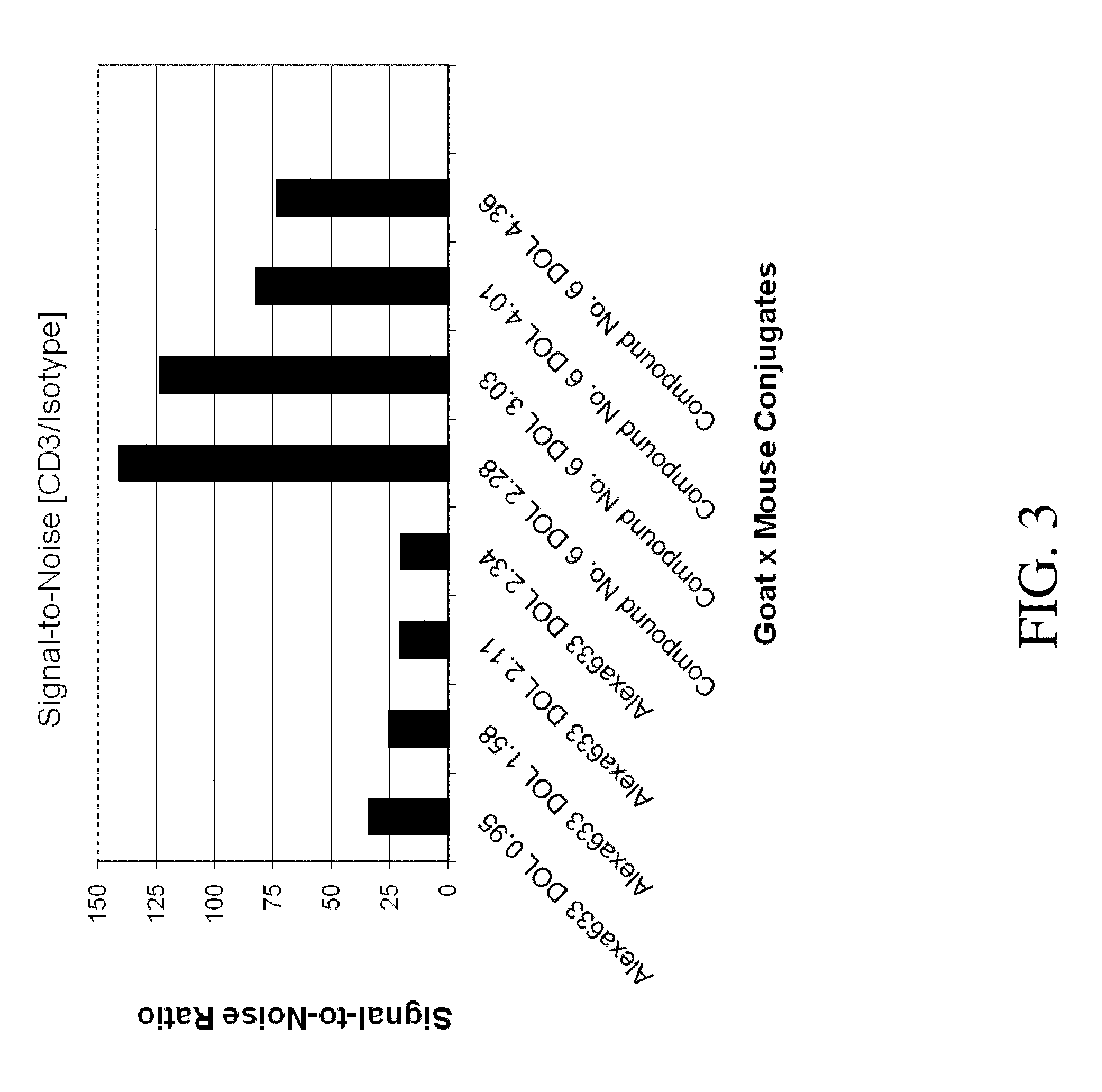Heterocycle-substituted xanthene dyes
a technology of xanthene dye and heterocycle, which is applied in the field of heterocycle-substituted xanthene dye, can solve the problems of poor water solubility and fluorescence quenching of xanthene dye, and achieve the effects of improving brightness, photostability and water solubility
- Summary
- Abstract
- Description
- Claims
- Application Information
AI Technical Summary
Benefits of technology
Problems solved by technology
Method used
Image
Examples
example 1
Preparation of 1-(5-ethoxycarbonylpentyl)-imidazole-2-carboxaldehyde (Compound No. 31)
[0625]
[0626]A mixture of imidazole-2-carboxaldehyde (1 g), potassium carbonate (6 g) and 6-bromohexanoic acid ethyl ester (1.84 mL) was stirred at 70° C. for 12 hours. The mixture was cooled to room temperature and then partitioned between water (100 mL) and ether (150 mL). The ether layer was washed with water twice (2×100 mL) and saturated NaCl (150 mL), followed by drying over anhydrous Na2SO4. The solvent was removed by rotary evaporation to give the product, which was used in the subsequent synthesis without further purification.
example 2
Preparation of Compound No. 32
[0627]
[0628]To a mixture of 7-hydroxy-1-ethyl-2,2,4-trimethyl-1,2-dihydroquinoline (1 g, 4.6 mmol) (U.S. Pat. No. 5,750,409) and compound No. 31 (0.48 g, 2 mmol) in CH2Cl2 was added trifluoroacetic acid (0.15 mL). The mixture was stirred at room temperature overnight and then concentrated to dryness in vacuo. The residue was dissolved in CHCl3 (5 mL) and MeOH (5 mL). p-Chloranil (0.5 g, 2 mmol) and molecule sieve (2 g) were added to the above solution. The mixture was stirred at room temperature for 3 days. The solution was concentrated to dryness in vacuo and the residue was purified by column chromatography on silica gel to give a blue solid (80 mg).
example 3
Preparation of Compound No. 33
[0629]
[0630]To concentrated H2SO4 (2 mL) with 30% fuming H2SO4 (0.1 mL) at 0° C. was added compound No. 32 (80 mg, 0.11 mmol) in one portion. The mixture was stirred at 0° C. for 2 hrs and then at room temperature for 2 days. The mixture was added dropwise to a vigorously stirred Et2O (30 mL) at 0° C. The precipitate was collected by centrifuge and the solid was purified by preparative HPLC to give a blue solid (40 mg).
PUM
| Property | Measurement | Unit |
|---|---|---|
| absorption maximal wavelength | aaaaa | aaaaa |
| absorption maximal wavelength | aaaaa | aaaaa |
| absorption maximal wavelength | aaaaa | aaaaa |
Abstract
Description
Claims
Application Information
 Login to View More
Login to View More - R&D
- Intellectual Property
- Life Sciences
- Materials
- Tech Scout
- Unparalleled Data Quality
- Higher Quality Content
- 60% Fewer Hallucinations
Browse by: Latest US Patents, China's latest patents, Technical Efficacy Thesaurus, Application Domain, Technology Topic, Popular Technical Reports.
© 2025 PatSnap. All rights reserved.Legal|Privacy policy|Modern Slavery Act Transparency Statement|Sitemap|About US| Contact US: help@patsnap.com



